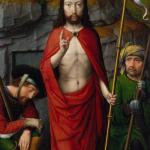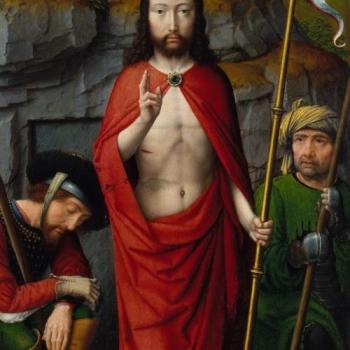There are, in fact, a number of passages in the Old Testament which could be seen as foreshadows of the Resurrection. For instance, the archetypal Third Day in the Creation narrative of Genesis tells us:
And God said, “Let the waters under the heavens be gathered together into one place, and let the dry land appear.” And it was so. God called the dry land Earth, and the waters that were gathered together he called Seas. And God saw that it was good. And God said, “Let the earth put forth vegetation, plants yielding seed, and fruit trees bearing fruit in which is their seed, each according to its kind, upon the earth.” And it was so. The earth brought forth vegetation, plants yielding seed according to their own kinds, and trees bearing fruit in which is their seed, each according to its kind. And God saw that it was good. And there was evening and there was morning, a third day. (Genesis 1:9-13)
And Jesus likens his Resurrection to the dying and rising seed:
Truly, truly, I say to you, unless a grain of wheat falls into the earth and dies, it remains alone; but if it dies, it bears much fruit. (John 12:24)
Another Third Day connection to the Old Testament can be found in the Great Theophany on Mount Sinai:
On the morning of the third day there was thunder and lightning, and a thick cloud upon the mountain, and a very loud trumpet blast, so that all the people who were in the camp trembled. Then Moses brought the people out of the camp to meet God; and they took their stand at the foot of the mountain. And Mount Sinai was wrapped in smoke, because the Lord descended upon it in fire; and the smoke of it went up like the smoke of a kiln, and the whole mountain quaked greatly. And as the sound of the trumpet grew louder and louder, Moses spoke, and God answered him in thunder. And the Lord came down upon Mount Sinai, to the top of the mountain; and the Lord called Moses to the top of the mountain, and Moses went up. (Exodus 19:16-20)
This defining moment is, in the history of Israel, what the Resurrection is in the history of Christianity. On this day—the Third Day–God enters into covenant with Israel and gives them the law. Similarly, Jesus, by his Resurrection, consummates the “new covenant in my blood” (Luke 22:20) and creates the spiritual “Israel of God” which is his body, the Church (Galatians 6:16).
Or again, the image of the Third Day connects Jesus with the foundational story of the great test to which Abraham was subjected at the climax of his story. Having waited till he was an old man for God to honor his promise of a son, Abraham is finally given Isaac, only to be commanded by God, as the boy reaches manhood, to “Take your son, your only-begotten son Isaac, whom you love, and go to the land of Moriah, and offer him there as a burnt offering upon one of the mountains of which I shall tell you” (Genesis 22:2). Abraham, in anguish, does as God commands and, “On the third day Abraham lifted up his eyes and saw the place afar off.” (Genesis 22:4). Abraham prepares to sacrifice Isaac but, just as he lifts the knife to strike, God stops him and shows him a ram to sacrifice in Isaac’s place. Then God tells Abraham:
By myself I have sworn, says the Lord, because you have done this, and have not withheld your son, your only-begotten son, I will indeed bless you, and I will multiply your descendants as the stars of heaven and as the sand which is on the seashore. And your descendants shall possess the gate of their enemies, and by your descendants shall all the nations of the earth bless themselves, because you have obeyed my voice. (Genesis 22:16-18)
Unlike the merely implicit connections to the Third Day in the Creation and Sinai narratives, the authors of the New Testament explicitly tell us they have this story in mind as they ponder the way Christ is hidden in the law and the prophets. For instance, the author of Hebrews tells us flat out:
By faith Abraham, when he was tested, offered up Isaac, and he who had received the promises was ready to offer up his only-begotten son, of whom it was said, “Through Isaac shall your descendants be named.” He considered that God was able to raise men even from the dead; hence he did receive him back and this was a symbol. (Hebrews 11:17-19)
A symbol of what? The Resurrection, of course, when a far greater Only-Begotten Son of a far greater Father (and yet also a son of Abraham) undergoes, not merely a symbol of death, but death itself and is received back by his Father in Heaven in the Ascension.
This symbol is crammed with meaning for the New Testament writers because they also see in it the fulfilment of God’s promise to Abraham that, “by you all the families of the earth shall bless themselves” (Genesis 12:3). That is, the promise to Abraham is not merely that his Jewish wdescendants will be blessed, but all the Gentiles as well. So when Jesus, the son of Abraham and son of God, rises from the grave he tells his Jewish disciples that he is “ascending to my Father and your Father, to my God and your God” (John 20:17). But that promise, says the risen Jesus, extends not merely to the physical descendants of Abraham, but to every human being on the planet who has the faith of Abraham in the promise of God. So Jesus tells his disciples:
All authority in heaven and on earth has been given to me. Go therefore and make disciples of all nations, baptizing them in the name of the Father and of the Son and of the Holy Spirit, teaching them to observe all that I have commanded you; and behold, I am with you always, to the close of the age.” (Matthew 28:18-20)
The promise of the blessings of Abraham being extended to the entire world through the risen Christ now brings us to the most explicit link we have regarding the meaning of the Third Day—and it comes to us from Jesus’ own lips:
Then some of the scribes and Pharisees said to him, “Teacher, we wish to see a sign from you.” But he answered them, “An evil and adulterous generation seeks for a sign; but no sign shall be given to it except the sign of the prophet Jonah. For as Jonah was three days and three nights in the belly of the whale, so will the Son of man be three days and three nights in the heart of the earth. The men of Nineveh will arise at the judgment with this generation and condemn it; for they repented at the preaching of Jonah, and behold, something greater than Jonah is here. The queen of the South will arise at the judgment with this generation and condemn it; for she came from the ends of the earth to hear the wisdom of Solomon, and behold, something greater than Solomon is here. (Matthew 12:38-42)
The story of Jonah’s three-day adventure in the belly of the whale was written, never forget, not for the benefit of the Assyrians to whom Jonah preached, but for his fellow Israelites. In the story, it is Jonah, not the Assyrians, who bitterly resents the message of repentance, forgiveness, and mercy that God offers this violent and cruel Gentile people. God tells Jonah to go to Nineveh, the capital of Assyria and warn them to repent or they will be destroyed. Jonah flees in the opposite direction by ship, not because he fears the Assyrians will not listen to him, but because he fears they will.
Jonah hates the Assyrians—a people who deeply deserve to be hated. They were cruel and sadistic conquerors, skilled in brutality and drenched in blood—including the blood of Israelites. They were the ones who destroyed forever the northern kingdom of Israel some seven centuries before Christ, scattering ten tribes of Israel to the four winds, never to be seen again. Jonah wants to see these pagans punished, just as Jesus’ contemporaries want to see their Roman conquerors (and their Jewish collaborators) punished. Jonah must go through a purgation of his pride and die to himself in order to be a sign, not merely to Assyria, but to his own people who share his opinion of Assyria.
In the same way, Jesus warns the proud Pharisees demanding a sign that God is offering himself not only to Israel, but to the Gentiles through the kingdom he is inaugurating. He points to two Old Testament examples of Gentiles—Jonah’s repentant Assyrians and the Queen of the South—who sought the God of Israel as the Gentiles will seek the risen Christ. It is the same point he has made elsewhere when he commends the faith of the Centurion who sought him to heal his servant:
I tell you, many will come from east and west and sit at table with Abraham, Isaac, and Jacob in the kingdom of heaven, while the sons of the kingdom will be thrown into the outer darkness; there men will weep and gnash their teeth.” (Matthew 8:11-12)
So Jonah is, at the end of the day, a reminder that the mission of Israel—and of the Messianic Servant of the Lord Jesus Christ—is to be a “light to the nations” (Isaiah 49:6), even the nations of Assyria and Rome. Jonah stands therefore as a foreshadow–and Jesus as the fulfillment of that foreshadow—of the gospel of the risen Christ that will reach to the ends of the earth through the Church.















